Are Mass Shootings a National Security Threat?
Phil Carter makes an interesting argument but he's ultimately mistaken.
Phil Carter makes an interesting argument:
Seventeen dead would have been a bad day in Iraq or Afghanistan at the height of our wars there. To see the same death toll Wednesday at a U.S. high school suggests American soil has become a battlefield, too.
That’s a powerful lede and points to our strongest point of agreement: mass shootings are in fact a greater threat to the security of Americans than quite a few external ones that get a massive amount of attention and other resources from our national security apparatus. From that, however, he pivots to our strongest point of disagreement:
A day before Nikolas Cruz’s shooting rampage in Florida and 1,000 miles away in Washington, the leaders of the nation’s 17 intelligence agencies briefed Congress on their 2018 worldwide threat assessment. This assessment detailed myriad threats to America’s national security from abroad—China, Russia, transnational organized crime, and terrorism—but ignored the threat from within posed by guns. Wednesday’s carnage in Florida illustrates the problem caused by this collective failure to see the existential threat posed by guns to Americans.
In addition to being a national security professional, Phil is not only an attorney but a law professor. So I’m especially troubled with the conflation of internal crime and external threats to our security. Again, we’re in full agreement that mass shootings are a major, preventable cause of death and destruction (albeit by no means an “existential” one; but I think Phil’s just being hyperbolic there). The average American has more to fear from a psychopath with a rifle than from the Islamic State, much less China. But that doesn’t make it any more a national security issue than texting while driving.
Implicit in the statement that a worldwide threat assessment from the nation’s intelligence agencies “ignored the threat from within posed by guns” is that they should have done otherwise. That we use the espionage and collection assets current law explicitly reserves for foreign actors on the American people. Phil no more believes that than I do—and I find the notion outrageous.
To the extent that mass shootings are a security threat under the purview of the Executive branch of our Federal Government, it’s a law enforcement, not a national security, function. That’s important in that the rules are completely different. American citizens have explicit rights under our Constitution that foreign actors do not.
In a handful of the recent cases, the shooters had posted some rather stark hints on social media of their intentions. I’m okay with the FBI investigating such threats. But I’m rather leery of giving them the power to data mine Twitter, Facebook, Reddit, and the like to look for patterns. The First Amendment surely includes a right to spout off nonsense on occasion without being targeted by law enforcement.
The rest of the article goes away from the opening premise and becomes a rather familiar argument for gun control. Among his proposals:
- Better regulation of guns or ammunition would be entirely justifiable and lawful under our Constitution, notwithstanding the Supreme Court’s recent jurisprudence on gun ownership. If the federal government can regulate explosives and machine guns, then certainly it can more closely regulate the acquisition of military-style rifles, high-capacity magazines, bump stocks, or military-grade ammunition.
- [R]egulate gun owners and their purchasing rights, such as is now the case for felons and others like those dishonorably discharged from the military. This path may be more fraught given the courts’ recent Second Amendment jurisprudence, which would require careful tailoring of any new rules that impinge on the constitutional right to bear arms. A lawful, common-sense approach would likely start by limiting gun acquisition by those on terrorist watch lists, or those with serious mental health disorders.
We’re more-or-less in agreement on these points. The caveats are two-fold. First, as Phil notes, the Supreme Court has ruled that most of this violates the 2nd Amendment and one suspects the addition of Neil Gorsuch to the Court makes that unlikely to change anytime soon. Second, I’m leery of the terrorist watch list, in particular, since it’s fraught with errors and reverses the presumption of innocence to which American citizens are entitled. Similarly, while it, of course, makes sense to deny the criminally insane access to weapons, we need to craft the protection in such a way as not to discourage people who need treatment from seeing mental health professionals.
Phil’s frustration spills out here:
Our national failure to smartly regulate guns or the people who get them leaves just one option: hardening civil defenses, the 21st-century equivalent of what we did during the Cold War to build bunkers and shelters to survive a potential nuclear exchange with the Soviets. Hardening schools, churches, and government buildings works to a point, but you can’t harden everything, and protecting some sites only turns others into more attractive targets.
This is, of course, not only impractical but likely ineffective. Shooters would simply target those running to the safe rooms.
He closes:
Our country spends hundreds of billions of dollars on an intelligence and military capability to protect Americans from external threats, both real and projected. We do quite little to protect Americans at home from the very real threat of guns—a threat which took an average of 42 lives per day in 2017. Framing matters. Presenting guns as a law enforcement issue has not catalyzed an effective response; describing gun violence in public health terms has illustrated the scope of carnage, but also not generated a sufficient societal response. Perhaps presenting gun violence as a national security threat will finally galvanize America to act.
That is, I suspect, Phil’s real point. Gun violence isn’t legitimately a national security threat and targeting it with the tools that we use against foreign threats would be more damaging than helpful. (Indeed, as I’m sure Phil would agree, shifting from seeing terrorism as primarily a law enforcement problem to primarily a military problem did much more harm than good on the national security front.) But, like Phil, I’m frustrated that the carnage has become so routine and we have yet to take any serious action against it.
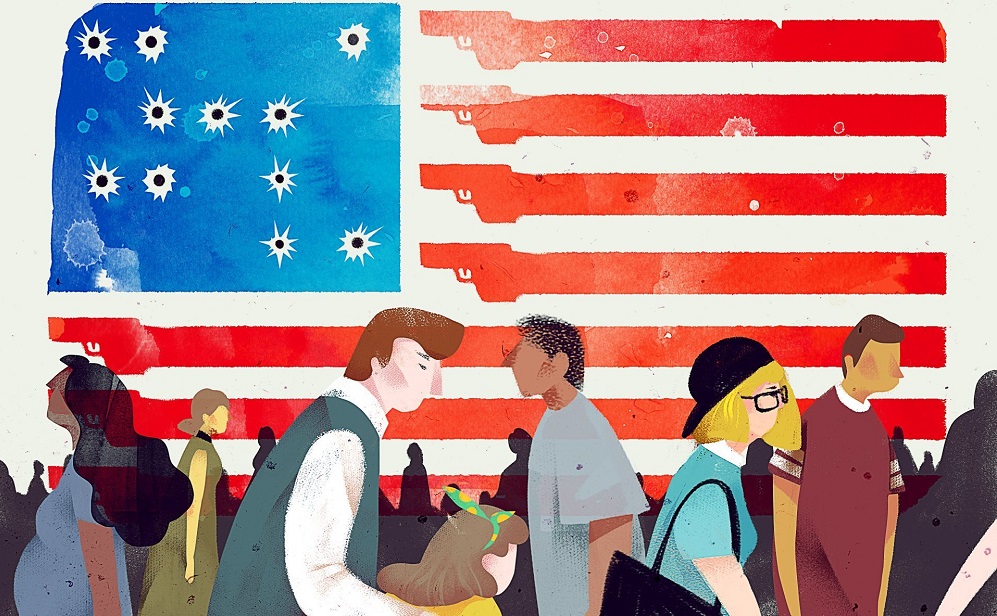

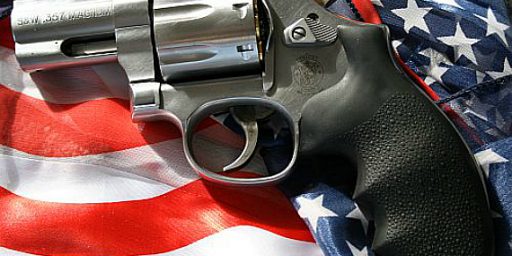
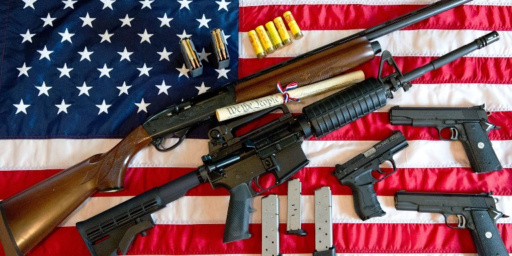
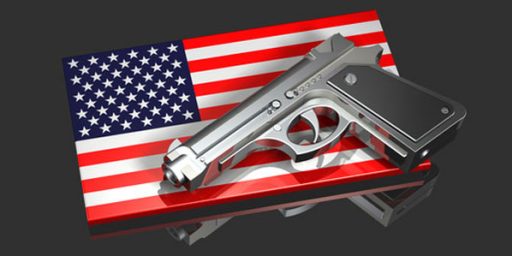
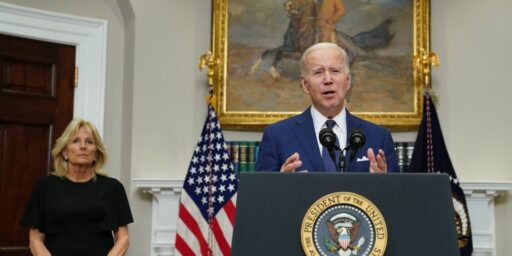

The Second Amendment has become our shared American suicide pact.
As it stands, a large part of the country thinks nothing can be done. Sad.
Interesting how Citizen’s United and the NRA fund those who say nothing cam be done.
I think it’s mainly a national trust issue. There are many “common sense” solutions to gun violence – but most of them require people to trust the government not to abuse their new power at the next excuse. In no other modern society do gun sales untracked, but of course tracked sales lead directly to a national gun registry, in turn allowing politicians to institute bans on specific guns effectively.
So the gun owners are worried that after the AR-15 ban comes the ban on all semi-automatic rifles comes the ban on pump action shotguns comes the ban on pistols comes the ban on revolvers, feel free to arrange the order according to which gun is used in the next event. And if you think that’s far fetched – the reason AR-15s are so popular is that the US banned the import of AK 47s after the LA shootout in 1989.
@Liberal Capitalist: The problem is two-fold. First, gun rights are just so baked into our culture that a large segment of the society is irrational about them. Second, as difficult as achieving sufficient consensus on this issue to pass a law is, amending the Constitution is much, much harder.
The national security threats are opportunistic politicians who use every catastrophe to enrich themselves by growing the government and an idiocracy believing themselves to be the elite entitled to rule all others. Both need to be shown the door.
Some would argue that the terrorist watch lists already have too much power, given that the criteria for ending up on one does not meet any particular legal standard and that people have no way of challenging their being on one.
You are certainly correct that however horrendous our national gun carnage is, it is not a national security issue. That said, the idea that the solution is to brick up all the windows in our schools and trade in busses for armored personnel carriers is abhorrent.
As I’ve said elsewhere, we need to start shaming the ridiculous man boys buying these weapons. We have literally millions of these let’s-play-pretend camo clothed doofusses he-manning themselves around, acting indistinguishably from the mentally disturbed who otherwise could be spotted before going off the deep end.
A case can be made that a homeowner with a handgun safely stored is protecting their home and family. Man-boys stockpiling assault rifles and shooting posters of Hillary Clinton are just ridiculous clowns. They are embarrassing themselves.
I think that equating school shootings as practiced here with terrorism or war is a metaphor.
I think that what a person using that metaphor is saying is that they think someone is both wrong and stupid who says: “…gun rights are just baked in…. (and) amending the Constitution is really really hard….”
It would be hard to win a war. We won. It would be hard to make us safe from terrorists. We did (mostly).
Now let’s do something else hard.
You’r quite right James. Mass murders, and inner city violence, and gun accidents, and suicide, are hardly existential threats to the nation. On the other hand, neither is terrorism.
We don’t have to amend the constitution. We have to change the Supreme Court. IIRC from 1791 until 2008 the court held that the “well regulate militia” phrase wasn’t just throat clearing, that the right to bear arms was a collective right, and the federal government, states, and cities could regulate the individual possession of weapons. To get back to a common sense interpretation we need to purge SCOTUS of the Federalist Society. Which is to say we have to prevent Republican Presidents from appointing Justices.
We’ve long had a lot of guns in the hands of citizens. But we didn’t have the crazy gun culture we now have until the last couple of decades. The biggest reason we have this culture is that Republicans cannot run on policy. Republicans are looking for any issue to drive a wedge between their base and society generally. Guns have been third behind race and abortion for that purpose. Now maybe fourth to immigration. But immigration is really race again, so no.
It will be slow, but the only way forward on guns is to elect Democrats. The existential threats to us are global warming, economic inequality, and Russia. At least two out of three can be dealt with easily if we get rid of Republicans. Sorry James, but Republicans are the existential threat to the United States.
@Stormy Dragon: Hell people have no way of knowing they are even on the list now.
@gVOR08: That’s quite a bit of fake history. From 1791 until 1931, SCOTUS didn’t get involved as there was no federal gun law, and federal restrictions were ruled out in Presser v. Illinois (which also outlawed overly restrictive gun laws by states). After 1931, the restrictions in place only dealt with fully automatic weapons, short barrel rifles and shotguns, and silencers. And only with trade thereof, not possession. The first federal law that made possession without registration illegal didn’t come about until 1968. That law also introduced the local rule that you could only buy a gun from your local federally licensed gun dealer, no more mail order guns from the back of a comic book.
The “SCOTUS ruled there was no individual right to bear arms before 2008” story is just as fake as “There was no collusion”.
Good news to start with: the murder rate in the US has been declining over the past 25-30 years. The bad news is that it is 3-4 times the rate of Canada and 4-8 times the rate of most EU nations, Israel, Japan, and China. I consider it a national security issue. The reason for having a nation is not to provide some bunting and a song to play at sporting events but to provide for safety and domestic tranquillity. We need to come together to address this problem while resisting the politicians who try to splinter us for their advantage. Our murder rate is too high, and we should not accept this. Yevtushenko famously said, “America, the stars on your flag are bulletholes.”
@MarkedMan:
Agreed. And I think Phil Carter would agree, too. My read is that he’s frustrated that the more obvious solutions–targeting the mentally ill and implementing some commonsense gun regulations that the overwhelming share of the public supports—haven’t been implemented and is suggesting this more in disgust than as a genuine alternative.
To get a better understanding read this.
http://monsterhunternation.com/2015/06/23/an-opinion-on-gun-control-repost/
Most people ignore the solutions presented by Lt. Col David Grossman. He’s given plenty of talks about how to beef up security at schools that would minimize access to psychos with guns. I believe that is a good place to start. Trying to give law enforcement the ability to storm “red flag” houses and confiscate weaponry is a disaster waiting to happen.
@technickelgeek:
OK, I was curious. The first thing I found that looked like it might be a good summary of Grossman’s views was from WAPO. In it he was training police to be more eager to kill. If you have a link that doesn’t make him look like the last thing we need, you should post it.
@technickelgeek: OK, I was curious enough to look. The first thing I found that looked like it might be a good summary of Grossman’s views was from WAPO. He was training cops to be more eager to kill. If you have a link that doesn’t make him look like the last thing we need, you should publish it.
Looks like students are trying to organize a brief school shutdown to protest violence.
http://abc30.com/students-activists-plan-school-walkouts-to-protest-gun-violence/3096311/
Looks to me like a small, but positive step.
Noted a headline the other day that touted a poll claiming a significant minority of Americans would support a military take over of the government. If such a take over occurred, I suspect one of the military’s first acts would be to clamp down on guns.
If this really is a national security threat, maybe it’s finally time to allow teachers and other school officials to carry concealed weapons in order to protect our children.
But snowflakes on the left aren’t actually interested in really protecting people.
@Liberal Capitalist: “We have met the enemy, and he is us.” Sorry, there isn’t any better news. A safer country will require better citizens and the not so better ones are the majority, at least in the practical sense.
@JohnMcC: Need good people to do the next hard thing. Moreover, it will take selfless people to do it. Both are in short supply here. Sorry.
@Jake: And Jake enters the fray to reinforce my theory. Thank you, I need all the help I can get.
@Mu:
Not really. You’re citing Presser without really reading it. Presser’s entire course of reasoning was predicated on the supposition that the entirety of the population capable of bearing arms constituted a reserve militia, in keeping with the part of the Second Amendment that Scalia pretended doesn’t exist. To wit:
Presser did not recognize some magical individual right. It didn’t do so because the 2A, as actually written, doesn’t enumerate one to begin with.
The only way is can possibly be read to do so is if one deletes half of the verbiage.
Hence McDonald & Heller 🙂
@TM 01:
Right, because the obvious solution to a child throwing rocks on the playground is to give every other kid a rock 🙄
Are you people all actually this disingenuous, or is it just active stupidity?
@HarvardLaw92: When you look back at old episodes of All in the Family in the ’70s, it’s amazing how little has changed. Archie’s arguments in favor of guns were played for laughs, but they sound barely any different from what the NRA crowd to this day says in dead earnest.
https://www.youtube.com/watch?v=-lDb0Dn8OXE
@gVOR08 He (Lt. Col. Grossman) has 2 publications which talk about violence and youth.
https://www.amazon.com/Assassination-Generation-Aggression-Psychology-Killing/dp/0316265934/ref=sr_1_1?s=books&ie=UTF8&qid=1499952341&sr=1-1&keywords=Assassination+generation
and
https://www.amazon.com/Stop-Teaching-Kids-Revised-Updated-ebook/dp/B00IBZ60AA/ref=sr_1_1?s=books&ie=UTF8&qid=1470926791&sr=1-1&keywords=stop+teaching+our+kids+to+kill#navbar
In those books he proposes not only his theories as to why kids might have a propensity for violent acts, but also talks about solutions to combat the violence.
To your point about teaching law enforcement to “kill” more easier to kill, he was in the army and developed techniques for soldiers to become more efficient at their jobs. He has several books on the warrior mindset which have become resources for training LEOs, Security, and Military. That shouldn’t detract from his talks about protecting our children, rather offer a unique perspective.
YMMV
@HarvardLaw92: I agree that Presser didn’t settle the question either way.
I was simply using it to pointing out that a “collective right 1791 – 2008” was BS.
@Mu:
That’s just my point – it wasn’t BS. It’s 100% accurate, although the applicable time frame is more accurately 1875 to 2010. Prior to McDonald & Heller, SCOTUS precedent (including Presser) decidedly viewed the right as being a collective one stemming from the viewpoint that the entirety of the able bodied population capable of bearing arms constituted a reserve militia within the context of the militia clause of the 2A. Indeed, Presser made two things quite clear in its reasoning:
1) It held that the 2nd Amendment was not incorporated, which simply reiterated the reasoning in Cruikshank, and;
2) It held that, while the 2A was not per se applicable to states, they nonetheless were debarred from completely disarming their citizens, but solely because doing so would prevent those citizens from fulfilling their constitutional duty at the federal level to serve as members of a reserve militia were they to be called upon to do so. It conferred no reasoning that disarming them would violate any individual right they held by virtue of the 2A.
You also left out United States v. Miller, which upheld the NFA and, in the process, directly defined the right enumerated in the 2A as being a collective one predicated on service in a militia (i.e. the NFA didn’t run afoul of the 2A because the weapons it banned could not reasonably be related to service in a militia).
I think maybe you need to reread Cruikshank, Presser and Miller. Prior to McDonald and Heller, these three rulings served for 135 years as the direct basis of lower federal courts pretty consistently (prior to McDonald and Heller) denying individual rights claims and underpinning the ability of states & localities to regulate firearms. Prior to 2010, the judicial norm up to and including SCOTUS precedent in the United States was to view the right enumerated in the 2A as being a collective one.
This is a good start.
https://www.reddit.com/r/liberalgunowners/comments/7y8xom/my_big_list_of_what_can_be_done_to_prevent_mass/
Certainly.
And yet, there is another threat out there that takes many dozens of lives every day in the US, and we as a nation seem to be collectively OK with that. If you think people fight hard to hang on to their guns, try taking away their car keys…